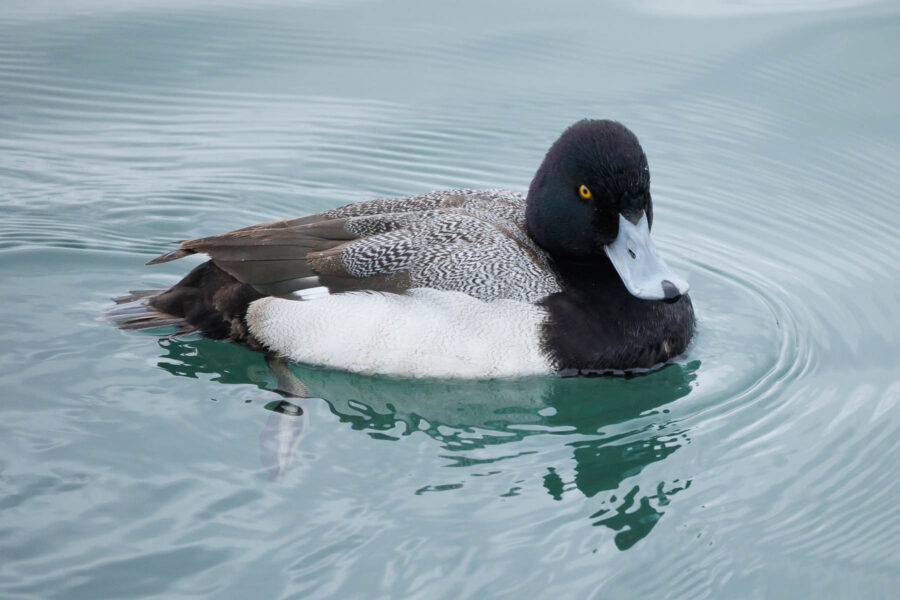Blue-billed and bound for the Bay

The lesser scaup, also known as a bluebill, is a medium-sized duck that breeds mostly in Canada but migrates to the Chesapeake Bay for the winter.
They are a diving duck, which means they find food by flipping their body horizontally and nose-diving into the water. Mollusks, plant material and aquatic insects are all on the menu for the lesser scaup, and much desired after a long flight from up north. Lesser scaups are fairly active foragers and can be seen diving and resurfacing frequently, looking for the perfect snack to help regain their strength.
The lesser scaup is a close relative of the greater scaup, which also breeds up north and migrates to the Bay. You would have to examine these two ducks closely to tell the difference between them. The primary feathers on the greater scaups are mostly white but on the lesser scaup they're mostly gray. The primary feathers are the longer feather closer to the tip of a bird’s wings. Greater scaups also have a much wider nail, which is the black tip at the end of a bill (like a fingernail). Lesser scaups are slightly smaller.
Another difference between the two ducks is the regions in which they migrate to. Both lesser and greater scaups can be found in the Chesapeake Bay but lesser scaups are more likely to be found further inland in freshwater lakes and ponds.
Both species, however, are in decline. They are not in danger of going extinct but the ducks have been unable to rebound from a decline in the 1980’s and 1990’s due to food shortages and habitat loss in both breeding and overwintering grounds.
The restoration and conservation of wetlands and forests across the watershed will surely benefit this beautiful, blue-billed duck as well as the other prominent waterfowl that visit our region.
Have you been lucky enough to spot a lesser or greater scaup? Let us know in the comments!

Comments
Saw my first blue bill in the creek , I’m on the seaside in Hog Island Bay Va
I have seen the Lesser Scaups here on the Chesapeake Bay each year in Feb/March. In the past, we’ve had hundreds but they a fewer in number these past few years.
We just saw one in Pascagoula, MS! Seems really far from home for this little guy. He was by himself. Absolutely gorgeous and made the cutest noises.
I saw a single male bluebill in Goodrieh-loomis Conservation Area (ON) today while walking over the bridge to the Pine Loop trail this morning. Beautiful!
I have seen about 6 here in Richmond the last couple of days.
First time I have seen scaup on Long Island Sound near Oyster Bay in years. Used to be thousands in the 70’s. They have been unusually close to shore for a diving duck, but maybe because it’s high tide now. Also swimming around Buffle Head and Golden Eyes.
We have about 200+ in front of our coastal house in NC. It is on a tributary off the Pamlico River. Absolutely gorgeous duck, piercing orange/yellow eyes with the hallmark turquoise bill. Fantastic to watch them forage and flock up.
Hundreds, if not thousands of them here on the Neuse River in New Ber, NC
I saw one today at the Hard Yacht Cafe in Dundalk. I was sitting next to a lady who showed me pictures and was telling me about them. Then I watched this beautiful duck. Its so nice to read this story that they are from Canada and migrate to the Chesapeake Bay. I'm going to keep my eye out for them in the future.
Northern Indiana. 29 ducks whirling and twirling diving in our lake. Named Sylvan Lake on this day 26th of March 2024
We have about 70 to 100 on our lake in Umatilla, FL. Been here for about a month now! Beautiful ducks and fun to watch. There are 3 other species as well.
We have 4 breeding males in our lake in Merritt Island,FL. Beautiful birds they are!
Had 3 today on Sable Lake in The Gardens, Parrish, FL.
We have 6-7 in our pond in Pinellas Park, FL
Thank you!
Your comment has been received. Before it can be published, the comment will be reviewed by our team to ensure it adheres with our rules of engagement.
Back to recent stories